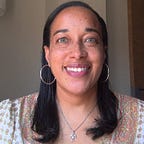Centering and Why It Matters…
Recently a couple of post popped up into my Twitter timeline. When I read a pulled quote or the title of the post, if a mirror was held up to my face at that moment, I looked like this young girl:
Things posted by people (and by people, I mean white people) as ground breaking data, epiphanies, or insightful in regards to race, but this newly gained “insight’” or “epiphany” has been obvious to me and many others for many years. In many cases the data or findings you’ve just shared, is the lived experience of my parents, friends, other family members, my kids, or even me and I wonder why it is new to you?
So why does this continue to happen? Part of the problem is people (and by people I mean mainly non-BIPOC) are completely oblivious to systemic racism and the numerous ways it manifests itself within our daily lives. Even in 2018, we have people still not completely grasping hold of the impact white supremacy and whiteness has on our society, its systems, and the overt and disguised mindsets of many of its members. As unbelievable as that may seem, it is the willful ignorance embedded within whiteness and white privilege that allows white people to navigate spaces freely, unharmed, and clear of hindrances from living lives not negatively dictated by race. Whiteness is so overarching within society it assists in maintaining a power hierarchy with BIPOC on levels beneath white people. This hierarchy clearly continues to provide a platform for white people to share post, data, or insight about race to BIPOC like Moses sharing the Ten Commandments from Mount Sinai to the Israelites.
As Uncle Ben told Peter Parker, “with great power, comes great responsibility.” I believe this is absolutely true, but also believe those with power and privilege must maintain high levels of mindfulness too. However, it seems as though power and mindfulness have somewhat of an inverse relationship for many. Mindfulness is where empathy resides. Mindfulness is where my privilege is leveraged to benefit others. Mindfulness is understanding I need to turn the volume up on someone else’s mic. Mindfulness is where power serves ourselves less to actually put energy towards empowering others more. Mindfulness is not disregarding self to the level where you are severely compromised, harmed, or hurt, but also unfortunately is not comfortable nor easy. Anytime we are involved in equity work, mindfulness must be firmly planted within the center. Mindfulness and decentering move us to flip the power hierarchy where the small number of those in power are now serving the masses of those not in power. This is true equity, where those considered the least are vaulted to the top of our platforms, plans, and policies, and no longer relegated to being afterthoughts or receiving what is “tickled down” from the powerful few at top. Mindfulness pushes and leads us (especially those folx with power and privilege) to also dismantle gates and remove gatekeepers that hinder equity for all.
We all must do better in order to shift the hierarchy of racial power with small meaningful and mindful steps at a time. One of those steps includes ceding the floor and centering voices of people of color in regards to race, racism, and racial injustices. As a white person ask yourself these questions:
- When can I recognize a platform is available for me, but should be used by someone else?
- When can I leverage my voice to remove a barrier that is a hindrance to that someone marginalized?
- When can I decenter myself and my narrative for another more poignant narrative instead?
Before hitting post on that blog, taking that new opportunity, overspeaking in a meeting, or walking through that newly opened door, pause and ask, is this a chance to center another person or voice instead of mine? Is there someone else who we need to learn and hear from in this situation? In most cases (especially in education) the answer is yes. Instead of generating generalized thoughts in regards to racism impact on education, the lack of racial mobility for BIPOC in professional spaces, or racial injustice that occurs within schools and society at large, actually listen and elevate specifically the voices of people who are living racialized lives. Instead of using a meeting or conference to share your newly found knowledge in regards to race and racial inequities in schools, pass the mic, invite and pay an BIPOC individual who is more well-versed and knowledgeable to do it for you. Instead of writing that blog about racial gatekeeping in schools that does not afford BIPOC the same opportunities for leadership, learning, and advancement in schools, open the gate and provide more space for BIPOC folx tell you first hand about their experiences instead.
Remember equity work is not a trend and it is also nothing new. As a third generation Black woman educator, I am well aware that racial injustice and inequity has existed in society and our school communities for an extremely long time. Instead of not listening to BIPOC folx and our lived experiences, do better. Dismantle the gates which hinder us from telling our stories and hold us back from opportunities. Always be mindful, decenter, and leverage your power. White people remember, this an important piece of equity work too.
